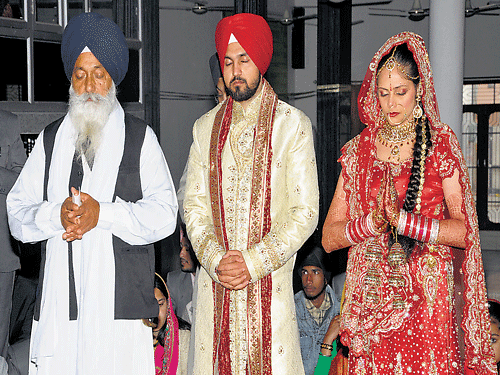
Scroll through any matrimonial advertisement in newspapers to get a glimpse of parents’ wish list. The staple ingredients in these columns remain much the same--good looks, tall, professionally well-settled boy or girl and then to caste considerations, if any, the wish list goes on.
But, there’s one thing that arguably distinguishes many Punjabi parents from others. It’s the longing to look for an non resident Indian (NRI) or a foreigner as a choice for marriage. Punjabis will do anything, well almost anything, to make sure they have a foothold abroad.
Marriage is increasingly becoming one of the options, even if it means marrying someone who is twice the age.
Sample this: In the Fatehgarh Sahib district of Punjab, a 20-year-old girl was married to a German national more than twice her age. The 53-year-old foreigner is a divorcee. In Amritsar, a 30-year-old man chose to marry a 43-year-old Italian. In the same district, a 26-year-old youth married a 41-year-old Filipino, a divorcee.
These are some instances of marriages with foreign nationals that have been
formally registered at various places in Punjab. One aspect remains common in all such marriages-- it’s the age gap between spouses. Several instances of marriages like these, where the age gap between the bride and the groom appears uncanny, arguably reflect upon the desperation of Punjab youth to settle overseas by way of marriage. Such arrangements have become increasingly common. Offshore dollar dreams are a big trigger for Punjabis to look for an overseas spouse.
In chief minister’s home constituency Lambi, a 30-year-old man chose to marry a 46-year-old woman from Kazakstan. Not far away in Malout town, a 20-year-old woman was married to a 45-year-old Austrian national. In Punjab’s Muktsar, a 28-year-old man got married to a London-based 37-year-old woman. In a state where every second house is said to have an NRI, Punjabis largely consider this route of offshore marriages as a quick “passport to emigrate abroad.”
Such matrimonial alliances may not find much space in advertisements. Most of these marriages are through recommendations or word of mouth. In many cases, the wannabe foreign bride or groom had known a Punjabi family or even stayed with them before an alliance was sought. It is said that every second house in Punjab’s Doaba region has an NRI member. In some cases, it is this Punjabi diaspora that suggests a foreigner as a possible match.
But in a majority of such cases, the foreign spouse-to-be would have visited India for some or the other purpose which is when the prospects of such an alliance would appear in sight. But there’s a serious flip side to this perceived “fast-track” way to settle abroad. Overseas marriage fraud is a fallout, and NRIs have been involved in several cases. It’s not to say that NRI marriages or the ones marrying foreign nationals end up in fraud or disarray. But Punjab is witnessing an increasing number of marriage fraud cases involving NRIs.
According to the National Commission for Women and the Ministry of Women and Child Development, of the 30,000 women deserted by NRI husbands, over 15,000 are from Punjab’s Doaba region. Punjab alone has several thousands of legal cases pending against NRI husbands, presumably for abandoning their wives. Whatever may be the outcome of an overseas marriage, the yearning to settle abroad by way of marriage has always remained top priority for Punjabi youth.
The website of the NRI wing of the Punjab police opens with a picture of an NRI marriage in progress. Alongside is a solitary picture of a distressed bride that sums up the doleful predicament of many such fraud marriages which are arguably outcomes of desperation that Punjabis have reflected to settle abroad. Punjab has taken a lead in bringing wrongdoers to justice. One such endeavour has been the establishment of a women’s grievance cell to lodge complaints from women who have been duped by their NRI
husbands or similar cases involving foreign marriages. So far, 48 passports of errant husbands have been confiscated by invoking the provision of the Passport Act, 1967.
Several dozen NRIs have been issued show-cause notices before the office finally acts to impound their passports. Section 10 (3) of the Passport Act states that the regional passport officer or the issuing authority can suspend or impound the passports of such offenders in public interest after issuing a show-cause notice. Once the passport is impounded, his travel ends.
In case an NRI is in India, it would not be possible for him to go back unless he settles his marital discord mutually or legally, an officer told Deccan Herald.
After the process to confiscate passport is initiated, relevant information is sent by the offices at all, including airports, embassies and police stations.
Jalandhar has the maximum number of cases registered against NRI grooms, followed by Hoshiarpur. According to sources, over 100 complaints are still under scrutiny after which appropriate decision will be taken whether or not to confiscate their passports. It’s a wake-up call for Punjabis. It’s already too late.